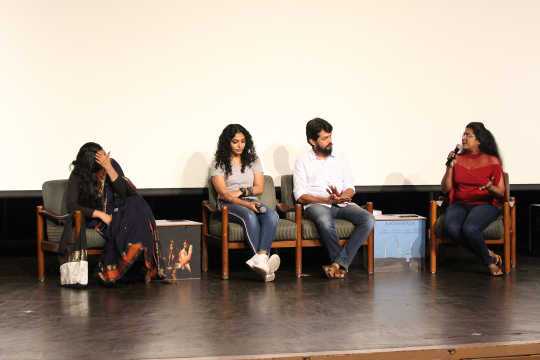Two years ago to the day, woman artistes and technicians came together to float an organization — Women in Cinema Collective (WCC) — to safeguard their interests in the film industry. It was the day Rima Kallingal and a number of other eminent women from Malayalam cinema, including Bina Paul, were pictured meeting chief minister Pinarayi Vijayan of Kerala.
Film critic Anna MM Vetticad opened the discussion by calling the WCC a milestone in the Indian feminist movement at large. She pointed out that it is an organization that has not got its due, not just in the media in Delhi and Bombay but also otherwise. The collective wasn’t set up to get certificates or medals; it is about building awareness.
“When you are aware of what they are doing, you can offer solidarity and also be inspired,” Vetticad said. “I believe this is a movement that could have been and still can be a source of inspiration to women of India’s cinema across the map and, of course, women from other industries.
“One thing that was important in Aabhaasam was representation. It’s not just the discussion on gender but it went beyond just speaking about women.” The critic felt that filmmaker Jubith Namradath choosing to cast a transgender actor in the role of a transgender person, instead of getting a man to dress in women’s clothes, was very significant.
“How much do you think the fact that there are still not enough strong roles for women in films across India, but in the Malayalam film industry specifically, how much does that contribute to the limits of the power women exercise in the industry? As a result of which there is discrimination, bias and so on,” Vetticad asked Kallingal.
Kallingal responded by saying that a whole “generation of Malayalam cinema can be remade from the heroine’s perspective. It would turn out to be a completely different movie.”
She went on to say gender representation has been widely ignored for the past decade. Looking back at her own experiences, she mused that it took a serious incident (the abduction and molestation of a popular Malayalam film actress in February 2017) for everyone’s eyes to be opened.
“Representing women and women being part of the creative and storytelling process is the only way we are going to start scratching the surface of this problem,” Kallingal said.
Padmapriya added that “it is not about having a female character or strong male character. It’s about having a strong story. About having diverse stories. It’s not necessary that this is what the audiences want.
“When I was shooting for Chef (2017, Hindi), there were like at least 40% women, not just at the top level but down the chain. From the ADs [assistant directors] to the runners to the art designers to the editor, the cameraperson. It was a fair balance of representation. When you have a good director on board — like Raja Krishna Menon — you can have a better character cause you can have a discussion around it.”
Vetticad asked Namradath how the film came to him naturally. “This is my first film,” the director said. “I enjoyed so much patriarchal bullshit. Over time I learned what’s wrong with it. I learned what’s wrong in my perspective, in my grooming. It’s with new experience you realize. You make attempts to correct it on a neutral level. Then you try and move on. You cannot move on without correcting it. A gradual attempt to sort out things one by one.”
Coming to Aabhaasam, he said, “There was a film, in 2010, that I made, a short film called Democracy: To Each His Own. It was also a bus movie. The idea of that was to represent India as a whole inside of us. With all sorts of people.
“I wanted that to be brought inside a film theatre. Bringing the audience to watch it in a theatre. Telling people that such films could be made. Aabhaasam was an attempt towards it,” Namradath said.
“It’s been two years. The truth is, when I first heard about the WCC, I didn’t think you would last six months. I knew it would be a massive battle. I thought you would get exhausted,” Vetticad said. What is the secret of WCC’s persistence?
“WCC happened because it was in Kerala. Because we have media. Because we have a society. Because we had a section of society that stood by us,” Kallingal answered. “WCC is celebrating its second anniversary and the best gift would be if we don’t exist anymore.”
Padmapriya said, “I hope we become non-existent soon — which is not going to happen — as that would be the biggest parameter for success.”

